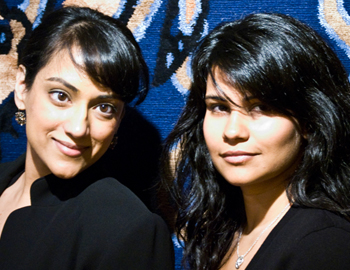Business & Health
South Asian Entrepreneurs Make Strides with Luxury Rugs
You might feel less guilty about buying a luxury item if the purchase benefits a worthy cause.
Nying Zemo, a New York-based rug company, provides such a unique shopping experience as the company uses a portion of its profits to support organizations targeting human trafficking, child prostitution and child abuse.
Shalini Acharya and Simmy Pappachen, who have South-Asian roots, co-founded Nying Zemo in 2006 with intentions of helping others. “We want to be more than just a business,” Acharya says. “We want to help make a difference.”
In a reflection of its humanitarian efforts, Nying Zemo is rug mark-certified, verifying that child labor is not used to produce the rugs. The certification also ensures that workers are provided with a clean, healthy work environment and education for their children.
Most recently, Nying Zemo unveiled its Aziz + Cucher collection at the International Contemporary Furniture Fair in New York. Conceptualized from original digital art, the pieces feature a wide range of stunning textures and colors. One technique used to create the collection included a digital form of pointillis, where artists combine an abundance of tiny painted dots to form one picture. The Nying Zemo designers typically substitute simple motifs for more inspiring designs, trumping pieces found in most high-end rug stores that offer a limited range of styles.
Creating a Masterpiece
Crafted in Nepal, Nying Zemo’s rugs are gaining notoriety for their distinct patterns, rich texture and artistic edge.
Nying Zemo — which means “beautiful” in the Tibetan language – offers rugs that display a distinctive, yet contemporary style, using high-end, silks and dyes. Other materials include long-fibered Tibetan highland wool, which is the finest wool available and known for its softness, luster and flexibility. Swiss dyes are typically applied for color, although natural dyes are also used.
The construction of each rug is a work of art in itself, taking anywhere from three to six months to finish at the company’s workshop in Nepal. The process begins with the time-intensive sorting, carding, spinning, dyeing, weaving, washing and trimming of Tibetan highland wool. Completed by hand, the process conveys the intricacies of the artwork conceptualized by each designer.
Weavers use the Tibetan knot technique rather than the two-knot method used in Persian rugs to make the rugs more durable. Senna hand-knotting, a technique derived from traditional Tibetan art, is also used. The Senna technique invokes the feeling of artwork rather than mundane home furnishing.
“Instead of just having art for the wall, people can have it for the floor,” Pappachen says.
Business Origins
Acharya and Pappachen met over a decade ago as classmates at the Fashion Institute of Technology in New York. Acharya’s family owned rug and textile factories in Nepal, where she was immersed in the art of Tibetan weaving.
Pappachen originally aspired to launch a lingerie company in her family’s native Kerala, India. Shortly after a stint working in the Pashmina fabric industry, Acharya recruited Pappchen to develop Nying Zemo.
Their daily responsibilities include close work with artists to properly match designs with available rug patterns, overseeing production, and communicating directly with interior designers, artists and the factory workers in Nepal. To maintain quality control on production, Acharya makes an annual trip to Nepal, often staying for several months.
Rugs with a Purpose
The International Labour Organization estimates that about 12,000 Nepalese children, primarily girls, are trafficked for commercial sexual exploitation each year within Nepal, or to brothels in India and other countries.
The duo said it’s important to continue the tradition of Tibetan rug weaving while giving back to her heritage nation.
ABC Nepal is one organization that has benefited from Nying Zemo’s proceeds. As a volunteer for human rights group, Acharya said she became familiar with the girls at the rescue shelters.
“Seeing these fragile girls [in person] has truly inspired me to help as much as I can,” she says.
Nying Zemo is also planning to host fundraising events benefiting ABC Nepal in Kathmandu.
Acharya and Pappachen say they’ve maintained the business by navigating around potentially impeding events. “When you have the knowledge, there are no major challenges,” Acharya says.
Citing her family’s entrepreneurial background, Acharya says she learned long ago what it takes to succeed in business.
“You always have to be smart, work hard, and not afraid of taking risks,” she says. “Being a woman has never been an issue, in fact I am proud to be a business woman.” ![]()

















